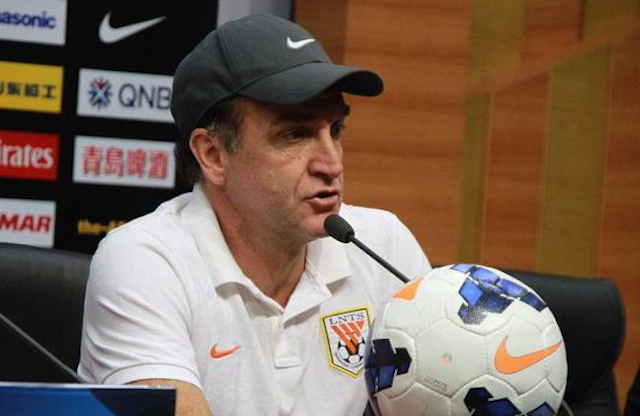That Shandong Luneng’s 2014 Chinese Super League season is not quite going to plan is clear for all to see and, as such, that attention should have shifted to the job security of manager Cuca is understandable.
This week, though, there appeared to be a major shift in the mood of the debate. Titan Sports, a renowned sports newspaper in China, published a piece in which an unnamed Luneng player accused their manager of having “no tactics” and of “drinking coffee with the foreign players during training”. If the players were turning on their manager, trouble surely lay ahead.
This is, of course, the same group of Luneng players who described widely respected former Barcelona manager Radomir Antic’s tactics as “backwards” last season and who, despite much hype, have underperformed consistently for the past three seasons since their last title win. However, there are influential figures within the camp whose network extends well beyond the playing staff.
The response, though, has been emphatic. Shandong are standing by their (expensively recruited) manager. First, senior players Han Peng, Zhao Mingjian and Wang Qiang published Weibo posts offering full support to their manager, before Luneng issued a scathing and almost sarcastic criticism of Titan’s editorial standards. Criticising the drinking of coffee, they stated, was an attack on Brazilians’ love of the drink, equivalent to saying that the Chinese like to drink tea.
Meanwhile, according to a report published on Sohu, a high-level figure within Luneng has promised to get rid of any of those not listening to their manager; what Cuca says goes.
Clearly things are not going right on the Shandong peninsular and the worryingly poor performances of the club’s expensively recruited foreigners Walter Montillo and Aloisio, in particular, will be a concern. Cuca’s inability to settle on a favoured lineup from his enormous and clearly talented squad is also an issue.
Questions will also be asked as to why Han Peng and Wang Dalei have been chosen to take over from captain Wang Yongpo and assistant Cui Peng mid-season, although that perhaps is clear indication of where Cuca sees the faults within his side.
Lying in fourth at present, Shandong will unlikely qualify for next season’s AFC Champions League despite expenditure that would make even champions Guangzhou Evergrande blush over the past 12 months. Action will be taken should it continue, but as the club pump money into infrastructure in Brazil, they appear to see Cuca as a key part of their long-term strategy.
While attention may focus on the big name managers in Guangzhou, it is Cuca’s season which could provide the outstanding narrative. Events in Shandong are worth a watch and it will be interesting to see if there is a reaction from the Luneng side in three important games ahead of the summer break. If not, it may well be that the vocal support for Cuca from within the club begins to wane.
